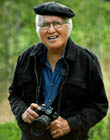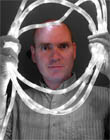|
|
This topic comprises 2 pages: 1 2
|
|
Author
|
Topic: Digital photography
|
|
|
|
|
|
|
|
|
|
|
|
|
Galen Murphy-Fahlgren
Master Film Handler

Posts: 405
From: Canton, MI, USA
Registered: Oct 2007
|
 posted 05-17-2008 01:36 AM
posted 05-17-2008 01:36 AM




Before you buy any camera, go to a real camera store and test drive a number of models. I'd say try at least Nikon and Canon, Pentax is worth a look if you are just shooting recreationally. The most important aspect of the camera is ergonomics. Canon and Nikon are going to be trading the lead in tech for a thousand years to come, but one camera will just feel right in your hands. For me, Nikon makes the best camera, and I recommend the D80 very strongly for someone with a decent budget. As for lenses, do not overlook the third party manufacturers. Tamron makes very high quality optics, although the build quality is mediocre. Sigma makes good lenses with a solid build, although quality control is suspect of late.
| IP: Logged
|
|
|
|
|
|
Galen Murphy-Fahlgren
Master Film Handler

Posts: 405
From: Canton, MI, USA
Registered: Oct 2007
|
 posted 05-17-2008 09:51 PM
posted 05-17-2008 09:51 PM




Mark, your comments about manual focusing tell me you need to switch to Nikon ASAP. Not only are most decent autofocus Nikkor lenses of a high build quality, all Nikon bodies accept the vast majority of manual focus lenses. The only ones that will not mount are those referred to as "non-AI" ( aperture indexing), which were made pre-1977 and are easy to avoid. Granted, the camera obviously won't autofocus, and only the higher end models will meter light, but if you are looking for real manual focus, that is the way to go.
Also, regarding RAW vs. JPEG, if you absolutely must shoot JPEG, give the Fuji cameras a look. They accept Nikon lenses and flashes and produce the best JPEGs of any camera on the market. The biggest drawback is that the S5 still goes for ~$1700, and the other models can only be had used.
| IP: Logged
|
|
|
|
|
|
Galen Murphy-Fahlgren
Master Film Handler

Posts: 405
From: Canton, MI, USA
Registered: Oct 2007
|
 posted 05-18-2008 06:22 PM
posted 05-18-2008 06:22 PM




Scott, not to hijack this thread into a discussion of Nikon glass, but I'd like to add to what you've said.
Firstly, non-AI lenses can be converted to AI'd at home for free, if you own jeweler's screwdrivers and a file. So, it is cost effective if you already have the lens or want some specialty lens, but since such old optics perform very poorly on digital cameras, trying to save money by buying and converting them is foolhardy. Also, non-AI lenses can be safely mounted to the F2, F3, F4, FM, and FT3 off the top of my head.
Nextly, the only difference between AI and AI-s lenses is if you have an FA, which is an expensive and relatively unreliable, albeit historically significant manual focus film body.
Also, in response to what Ken said a few posts back, I feel it is imperative to spend more on the lens than most consumer cameras cost. The camera will be obsolete in a couple of years, whereas the lens may not be for decades. Also, the lens has more to do with the quality of the final image than modern bodies, since the sensors are very good for the most part. Do you have Schneiders and Iscos, or crap Chinese lenses on your projectors? Why?
| IP: Logged
|
|
|
|
|
|
|
|
All times are Central (GMT -6:00)
|
This topic comprises 2 pages: 1 2
|
Powered by Infopop Corporation
UBB.classicTM
6.3.1.2
The Film-Tech Forums are designed for various members related to the cinema industry to express their opinions, viewpoints and testimonials on various products, services and events based upon speculation, personal knowledge and factual information through use, therefore all views represented here allow no liability upon the publishers of this web site and the owners of said views assume no liability for any ill will resulting from these postings. The posts made here are for educational as well as entertainment purposes and as such anyone viewing this portion of the website must accept these views as statements of the author of that opinion
and agrees to release the authors from any and all liability.
|

 Home
Home
 Products
Products
 Store
Store
 Forum
Forum
 Warehouse
Warehouse
 Contact Us
Contact Us




 Printer-friendly view of this topic
Printer-friendly view of this topic










![[Big Grin]](biggrin.gif)






